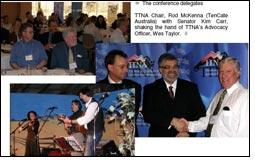 Playing on a parody of the legendary Sky Hooks song that anyone over 40 remembers, Senator Kim Carr, the Australian Labor Party’s Shadow Minister for Industry, Innovation, Science and Research, assured a gathering of the said age group at the recent TTNA annual conference that a “policy for industry was not a dirty word”.
Playing on a parody of the legendary Sky Hooks song that anyone over 40 remembers, Senator Kim Carr, the Australian Labor Party’s Shadow Minister for Industry, Innovation, Science and Research, assured a gathering of the said age group at the recent TTNA annual conference that a “policy for industry was not a dirty word”.
Courageously entering territory where few politicians dare to tread, Senator Carr promised to deliver an industry policy based squarely on innovation if Labor were to be elected.
Taking the brief from another, lesser known Skyhooks song, “Over the Border”, the TTNA conference was held in Albury within a stone’s throw of the once mighty Murray.
Addressing delegates over breakfast at the conference, Senator Carr said that Labor’s aim is to revitalize mature industries in order to ensure emerging industries can develop and flourish. “Textiles, Clothing and Fashion (TCF) is not dead – I say that the sector has an exciting future.”
Technical and nonwoven textiles represent a booming success story in this country. The industry employs 13 per cent of the total TCF employment and its share in terms of dollars is even more significant.
The industry has been and will continue to be driven by innovation, which the Senator claimed is high on Labor’s agenda. “It is not just a good idea to encourage and promote innovation; it is a critical part of boosting productivity."
"In short, generating and implementing new technology and business processes is a critical part of building and maintaining a growing, competitive economy."
 "We must build a culture of innovation, where backing new ideas is the rule rather than the exception.” Labor promised to end the fragmentation and duplication of Commonwealth and State programs of industry assistance in innovation.
"We must build a culture of innovation, where backing new ideas is the rule rather than the exception.” Labor promised to end the fragmentation and duplication of Commonwealth and State programs of industry assistance in innovation.
A promise to look harder at the current arrangements for the R&D Tax Concession, with a view to developing a much more effective scheme was welcomed. There is no doubt that the Government’s cuts to the tax concession in 1996 were damaging to Australian industry across the board.
Commonwealth support for R&D under the basic tax concession was worth 18¢ in the dollar 11 years ago; now it is worth 7.5¢ in the dollar. As a result, in manufacturing, R&D spending went backwards for four years in a row.
Wes Taylor, Advocacy Officer for the TTNA, is of the view that the current R&D Tax Concession is hardly worth the effort. “Starting with the premise that R&D is vital to innovation and vital to the long-term prosperity of individual companies and the Australian economy, the current program falls short of useful for small to medium sized companies,” Mr. Taylor stated.
Whilst the senator claimed the R&D tax concession was “critical”, he wouldn’t be drawn on specifics, informing the conference that Labor is looking hard at the current arrangements with a view to developing something better.
“We must change attitudes to this crucial part of business development, and we believe that the tax concession — while it cannot be a stand-alone policy - is a key part of the suite of mutually reinforcing policies that will do this.” One option cited is that companies investing more than 1 per cent of turnover in R&D would qualify for a higher concession.





